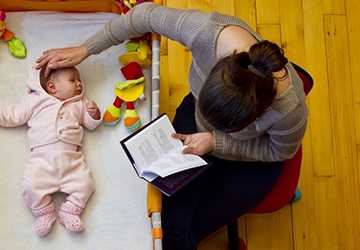Vaccination Schedule for Newborns
Embarking on the path to safeguard your newborn's health starts immediately after birth. One of the most significant actions is following the advised immunization timetable. This primer reinterprets the newborn vaccination schedule, presents a comprehensive baby immunization guide, and underscores the critical importance of vaccines for infants, ensuring the health and safety of your precious one.

The Imperative of Immunizations for Babies
Immunizations serve as your newborn's initial defence against many infectious agents. These preventive measures educate the immune system to identify and defeat viruses and bacteria, thus averting sickness. Compliance with the newborn vaccination schedule is a proactive strategy to maintain your infant's health and protect it from grave medical conditions.
Essential Immunizations for Newborns
Exploring the critical vaccines necessary within your infant's initial year:
● Hepatitis B: Administered shortly after birth, this vaccination fights against the hepatitis B virus, renowned for inducing significant hepatic complications and cancerous growths.
● DTaP is a composite vaccine that provides defence against diphtheria, tetanus, and pertussis (whooping cough) starting at two months of age.
● Hib (Haemophilus influenzae type b): Shields against a bacterium capable of triggering severe pneumonia and meningitis.
● Polio (IPV): Commenced at two months to prevent polio, which can lead to paralysis.
● PCV13 (Pneumococcal vaccine): Commences at two months to prevent pneumonia, meningitis, and otitis media caused by pneumococcal bacteria.
● Rotavirus: This is an oral vaccine designed to shield against rotavirus, a leading cause of acute gastroenteritis among infants and toddlers, commencing at two months.
● MMR: Protects against measles, mumps, and rubella, typically administered between 12 to 15 months of age.
● Varicella: Given between 12 to 15 months to prevent chickenpox.
Structuring Your Infant's Vaccination Timeline
Monitoring your infant's immunization dates is vital to ensure they are vaccinated timely. Below is a streamlined baby immunization guide for planning:
● Upon birth: Hepatitis B vaccination
● At the age of 2 months: Commencement of DTaP, Hib, IPV, PCV13, and Rotavirus vaccinations.
● At 4 and 6 months: Continuation of DTaP, Hib, IPV, PCV13, and Rotavirus immunizations.
● Between 12 and 15 months: MMR and varicella vaccines, plus additional Hib and PCV13 booster vaccines.
Strategies for Overseeing Your Infant's Vaccination Chart
● Maintain a vaccination log: Record every vaccine to accurately monitor your infant's immunization record.
● Engage with your paediatrician: Consistent appointments with your paediatrician are essential to adhere to the vaccination timetable and address any queries.
Tackling Vaccination Hesitations
It's common for parents to express concerns regarding necessary vaccines for infants. To offer peace of mind:
● Proven Safety and Effectiveness: Vaccines undergo extensive trials before public recommendation to confirm their safety and efficacy.
● Transient Side Effects: Vaccines might lead to mild reactions, like slight fever or discomfort at the injection site, but these effects are temporary and minor compared to the risk of the illnesses they prevent.
Tailored Immunization Strategies
Attention to Early Arrivals
For babies who arrive ahead of schedule, the immunization timetable might need to be customized. It is crucial to engage with a paediatrician to design a vaccine protocol that aligns with your infant's unique developmental requirements.
Preparing for Global Adventures
Families looking to explore the world should consider additional immunizations to shield against region-specific illnesses. Consulting healthcare professionals about necessary vaccines for international travel can ensure your little ones are well-protected.
Fostering an Immunization-Supportive Environment
Enhancing community health begins with supportive immunization practices. Here are ways to positively impact:
● Informing Your Network: Spreading validated knowledge on vaccine efficacy among your social circles can dispel myths and elevate vaccination rates within the community.
● Championing Vaccine Initiatives: Participating in and advocating for local and broader vaccine drives ensures critical vaccine access for all children, emphasizing the universal right to health.
Innovative Approaches to Enhancing Immunization
Customized Immunization for Early Arrivers
Infants making their debut ahead of their due dates often necessitate a bespoke approach to immunizations. It's imperative to engage with healthcare providers to craft an immunization regimen that caters to the distinct medical needs of these early arrivals.
Immunization for Global Explorers
Families embarking on international journeys may need to consider extra vaccinations to fend off diseases prevalent in their destinations. A consultation with a healthcare specialist can provide a roadmap for necessary immunizations, ensuring comprehensive protection for young adventurers.

Strengthening the Immunization Support System
Promoting a culture of immunization within the community plays a pivotal role in public health enhancement. Strategies to elevate the importance of vaccinations include:
● Educational Outreach: Amplifying factual and scientifically backed information on the benefits of vaccinations can help dispel myths and misinformation, thereby improving immunization rates.
● Advocacy for Accessibility: Championing efforts to make vaccines more accessible to all children underscores the commitment to public health and equity, ensuring no child is unprotected.
The Collective Benefit of Vaccinations
Vaccinations extend beyond individual health, serving as a cornerstone for community wellness by fostering herd immunity. This collective defence mechanism is critical in protecting those who cannot be vaccinated, highlighting the communal value of widespread immunization efforts.
Expanding the Horizon of Immunization
The ongoing pursuit of innovation in vaccination technology promises to revolutionize the field. From developments in vaccine delivery methods to the customization of vaccines based on genetic makeup, the future of immunization is poised for significant advancements. These innovations aim to enhance the efficacy of vaccines, reduce discomfort associated with administration, and ensure a more personalized approach to disease prevention.
Vaccines: Pillars of Community Health
Beyond individual protection, vaccines are instrumental in nurturing communal well-being through herd immunity. This protective shield emerges when a substantial population receives vaccinations, indirectly safeguarding those who haven't been immunized.
Conclusion
Committing to the newborn vaccination schedule is fundamental in securing a healthy outlet for your child. By observing this baby immunization guide, you shield your newborn and play a part in the collective effort to fend off preventable diseases.
The commitment to vaccination is a testament to the shared responsibility of protecting the most vulnerable. It underscores the critical role of vaccines in the tapestry of public health.







